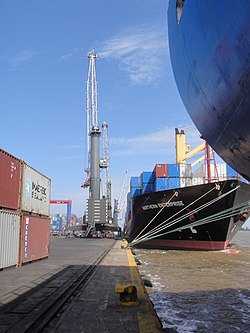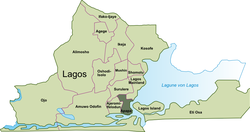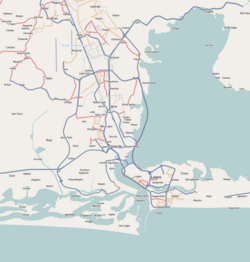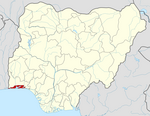Apapa
Apapa | |
|---|---|
 Apapa Port | |
 | |
| Coordinates: 6°27′N 3°22′E / 6.450°N 3.367°E | |
| Country | |
| State | Lagos State |
| City | Lagos |
| Government | |
| • Sole Administrator | Jide Alao |
| Population (2006) | |
| • Total | 217,362 |
| Time zone | UTC+1 (WAT) |
 | |
Apapa is a Local Government Area in Lagos, located to the west of Lagos Island. Apapa contains a number of ports and terminals operated by the Nigerian Ports Authority (NPA), including the major port of Lagos State and Lagos Port Complex (LPC).Federal Government[1]
In its legislation, the NPA itself does not refer to any port called "Port of Apapa", rather it refers to the "Port of Lagos", "Port of Port Harcourt" and "Port of Calabar".[2]
The region of Apapa lies near the mouth of Lagos lagoon, and contains ports and terminals for various commodities such as containers and bulk cargo, houses, offices and a small old disused railway station (Apapa North). It is the site of a major container terminal which was owned and operated by the Federal Government of Nigeria until March 2005, and now is operated by the Danish firm A. P. Moller-Maersk Group.[3] Adjacent to the container port is the Tin Can Island Port, which has ro-ro facilities.[4]
It also houses some refineries like the Bua Group. It also has commercial offices of many shipping, clearing and transportation companies. Other notable buildings include the Folawiyo Towers. Apapa houses the headquarters of the Nigerian newspaper Thisday.[5]
History
[edit]An important bronze hoard of jewellery dating from the 16th Century was found in Apapa in 1907 and is now kept at the British Museum.[6]
In 1950, the development of an industrial and housing estate covering 1000 acres began. The estate was completed in 1957/1958 and it flourished along with the expansion of the Apapa Wharf. The estate once accounted for a large number of industrial and construction workers in Lagos.[7]
Government and infrastructure
[edit]This section needs expansion. You can help by adding to it. (March 2016) |
Prisons of the Nigerian Prisons Service include:
Housing, education and social facilities
[edit]
The district provides housing for various levels of housing needs from executive requirements to average families including single occupation and multiple storied accommodation. There are several schools. The German School Lagos was formerly located in Apapa.[8]
Social and recreational facilities are provided by private and public organizations including a boat club located on Apapa Creek.
Transportation
[edit]Apapa contains a number of ports and terminals operated by the Nigerian Ports Authority (NPA), including the major port of Lagos State and Lagos Port Complex (LPC).Federal Government[9]
See also
[edit]- Railway stations in Nigeria
- Apapa Amusement Park
References
[edit]- ^ "Our Ports - NPA". nigerianports.org/. Nigerian Port Authority. Retrieved 12 September 2015.
- ^ NPA Pilotage Districts Order - Section 58 - Cap. NLN. 126 (LN. 252 of 1959) (PDF). Lagos: Nigerian Port Authority. 1959. Archived from the original (PDF) on 4 March 2016. Retrieved 12 September 2015.
- ^ Tancott, G (19 January 2015). "16 new RTG cranes for APM". Transport World Africa. Retrieved 12 September 2015.
- ^ "Dredging for Contaienr Terminal in Apapa". Dredging Today. Retrieved 12 September 2015.
- ^ "Contact Us Archived 13 November 2011 at the Wayback Machine." Thisday. Retrieved on 16 November 2011. "THISDAY LIVE, 35, Creek Road, Apapa, Lagos, Nigeria"
- ^ "bracelet | British Museum". The British Museum. Retrieved 17 May 2023.
- ^ Okin, Isaac Abodunrin (1972). The urbanization process in the developing countries: a case study of Lagos, Nigeria (Thesis thesis).
- ^ Home page. German School Lagos. 2 March 2003. Retrieved on 18 January 2015. "Beachland Estate Ibafon, Apapa, Lagos Nigeria"
- ^ "Our Ports - NPA". nigerianports.org/. Nigerian Port Authority. Retrieved 12 September 2015.


